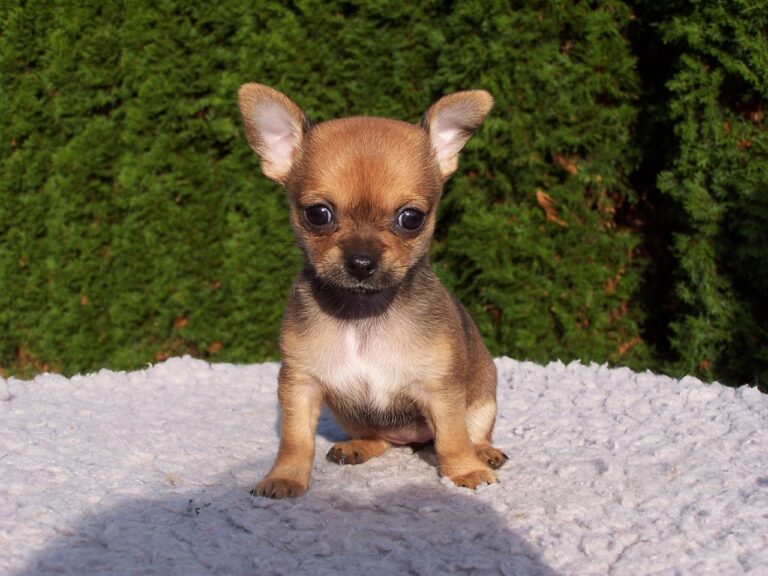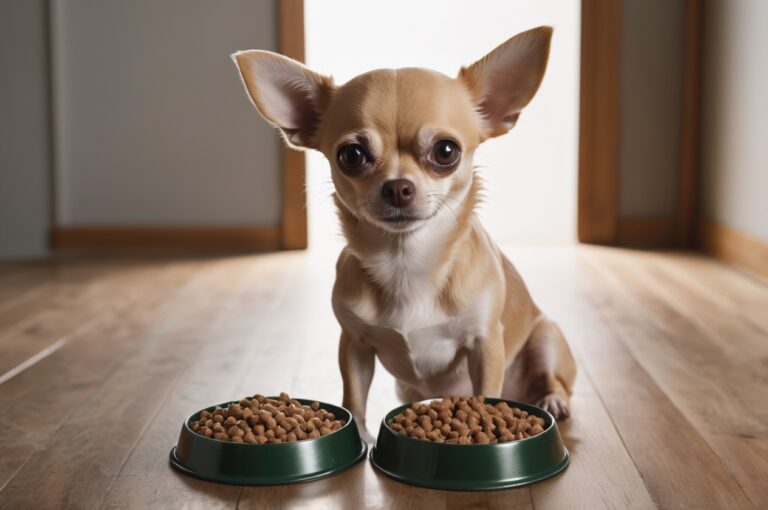What to Feed Your Chihuahua: A Guide to Proper Nutrition

Chihuahuas may be small, but their nutritional needs are just as important as those of larger breeds. A proper diet is essential for maintaining their energy, supporting their overall health, and ensuring they live long, happy lives. Because of their small size and delicate structure, Chihuahuas require balanced nutrition that is specifically tailored to small breeds. Feeding your Chihuahua the right diet helps prevent common health issues such as obesity, dental problems, and even long-term conditions like diabetes and heart disease.
In this guide, we will explore what to feed your Chihuahua to meet their nutritional needs at every stage of life, how to choose the right foods, and what to avoid to ensure your furry friend stays in optimal health.
1. Understanding Your Chihuahua’s Nutritional Needs
Chihuahuas have specific dietary requirements due to their small size, high metabolism, and unique health needs. Ensuring they get the right balance of calories and nutrients is crucial for maintaining their energy and preventing both overfeeding and underfeeding. Understanding their caloric intake, essential nutrients, and adjusting their diet based on their age or life stage will help keep them healthy throughout their lives.
1.1 Caloric Requirements for Small Breeds
Chihuahuas have high metabolic rates, meaning they burn calories quickly, but they also have very small stomachs, so portion control is important. The exact number of calories your Chihuahua needs depends on several factors, including their age, weight, activity level, and overall health. On average, an adult Chihuahua weighing between 4 to 6 pounds requires between 150 to 250 calories per day, depending on their activity level. More active dogs may require slightly more, while less active or older dogs may need fewer calories.
Puppies have higher caloric needs as they grow, often requiring up to twice the amount of food relative to their body weight compared to adult dogs. On the other hand, senior Chihuahuas may need fewer calories to prevent weight gain as their metabolism slows down.
It’s important to monitor your Chihuahua’s body condition regularly to ensure they’re neither underfed nor overweight. If your dog starts to gain or lose weight unexpectedly, it’s worth consulting with a vet to adjust their diet accordingly.
1.2 Essential Nutrients for a Healthy Chihuahua
Just like all dogs, Chihuahuas need a balanced diet that includes all essential nutrients to maintain optimal health. These nutrients include:
- Protein: A vital component for muscle development, maintenance, and energy. Look for dog food that lists real meat, such as chicken, beef, or fish, as the primary ingredient. Protein should make up about 20-30% of your Chihuahua’s diet.
- Fats: Healthy fats, particularly omega-3 and omega-6 fatty acids, are important for coat health, brain function, and overall energy. Fat should constitute about 10-15% of their diet, but avoid too much fat, as this can lead to obesity.
- Carbohydrates: While not as critical as protein and fats, carbohydrates provide a source of energy and fiber. Whole grains like brown rice or oats, as well as vegetables, are good sources of digestible carbohydrates.
- Vitamins and Minerals: Vitamins like A, D, E, and B complex, along with essential minerals such as calcium, phosphorus, and zinc, are necessary to support your Chihuahua’s immune system, bone health, and metabolism. A high-quality dog food will already be enriched with these nutrients, so additional supplements are usually not necessary unless recommended by your vet.
Water is also a crucial component of your Chihuahua’s diet. Always ensure they have access to fresh, clean water throughout the day, as dehydration can quickly become an issue for such a small breed.
1.3 Adjusting Diet for Life Stages
As your Chihuahua grows and ages, their dietary needs will change. Puppies, adults, and senior dogs all require different types of nutrition to support their health at various life stages.
- Puppies: Chihuahuas grow rapidly during their first year of life and need a diet that is rich in protein, fat, and essential nutrients to support their development. Puppy-specific food is formulated to meet these higher nutritional needs, so be sure to feed them a high-quality puppy formula until they reach adulthood (around 12 months).
- Adult Dogs: Once your Chihuahua reaches adulthood, you can switch them to a standard adult dog food formulated for small breeds. At this stage, the focus should shift to maintaining a healthy weight and ensuring they get the right balance of protein, fats, and carbohydrates to sustain their energy levels.
- Senior Dogs: As Chihuahuas enter their senior years (around 8-10 years), their metabolism slows down, and they may become less active. Senior dog food is designed to be lower in calories and fats while still providing essential nutrients to support joint health, digestion, and cognitive function. Senior Chihuahuas may also benefit from foods that are easier to chew if they have dental issues.
2. Choosing the Right Food for Your Chihuahua

When it comes to feeding your Chihuahua, selecting the right type of food is key to meeting their specific needs. Whether you choose dry kibble, wet food, or a combination of both, it’s important to focus on high-quality ingredients that provide balanced nutrition. Additionally, decisions around grain-free diets or selecting the best dog food brand can significantly impact your Chihuahua’s overall health and well-being.
2.1 Dry Food vs. Wet Food
One of the main decisions when feeding your Chihuahua is whether to choose dry kibble, wet food, or a combination of the two. Each type of food has its benefits and drawbacks, so it’s important to understand how each option might affect your Chihuahua.
- Dry Kibble: Dry food is often the preferred choice for Chihuahuas due to its practicality and dental benefits. The crunchy texture of kibble helps remove plaque from teeth, which is especially important for Chihuahuas, as they are prone to dental issues. Kibble is also easier to store, has a longer shelf life, and is more affordable than wet food.
- Wet Food: Wet food can be more palatable for picky eaters and is an excellent source of hydration for Chihuahuas who may not drink enough water. However, wet food can stick to teeth and contribute to dental problems if proper oral hygiene is not maintained. Wet food is also more expensive and has a shorter shelf life once opened.
- Combination Feeding: Many Chihuahua owners opt for a combination of both wet and dry food to offer variety and ensure their dog is getting the best of both worlds. You can mix the two together or alternate between meals of wet and dry food. Just be mindful of portion control to prevent overfeeding.
2.2 Grain-Free or Not?
In recent years, grain-free diets have gained popularity, but there is ongoing debate about whether they are beneficial or necessary for most dogs. Some Chihuahuas may have grain allergies or sensitivities, and in such cases, a grain-free diet might be recommended. However, grains like brown rice, barley, and oats can be good sources of carbohydrates and fiber for most dogs.
The FDA has raised concerns about a potential link between grain-free diets and heart disease in dogs, particularly when these diets rely heavily on peas, lentils, and potatoes as fillers. Before switching to a grain-free diet, it’s important to consult your veterinarian to ensure it’s the right choice for your Chihuahua.
2.3 Selecting High-Quality Dog Food Brands
When choosing food for your Chihuahua, it’s essential to select a high-quality dog food brand that meets industry standards and provides complete and balanced nutrition. Look for dog food brands that are formulated specifically for small breeds and meet the standards set by the Association of American Feed Control Officials (AAFCO). Always check the ingredients list to ensure that the primary ingredient is a high-quality protein source, and avoid foods that contain by-products, fillers, or artificial additives.
Brands that use real, whole ingredients and avoid unnecessary fillers provide better nutrition and are more digestible for your Chihuahua. Many premium dog food brands also offer specialized formulas for Chihuahuas with specific needs, such as weight control, skin sensitivity, or digestive health.
3. Supplementing Your Chihuahua’s Diet

In addition to regular meals, supplements and healthy snacks can help boost your Chihuahua’s overall health. Providing the right supplements and incorporating fresh, natural foods into their diet can improve everything from coat quality to joint health. However, it’s important to be cautious with portion sizes and ingredients to avoid overfeeding or giving your Chihuahua something harmful.
3.1 Healthy Snacks and Treats
Treats are a fun way to reward your Chihuahua, but it’s important to ensure that the snacks you offer are healthy and won’t contribute to weight gain or dental problems. Small breeds like Chihuahuas are particularly prone to obesity, so treat portions should be controlled carefully. When choosing treats, look for low-calorie options that are made from wholesome ingredients. Treats made with natural ingredients like chicken, sweet potatoes, or pumpkin are great choices.
Another option is to offer vegetables or fruits as snacks. Carrots, apples (without seeds), blueberries, and cucumbers are safe and healthy for Chihuahuas in moderation. These snacks are low in calories, packed with vitamins, and can help clean teeth while your Chihuahua chews.
Avoid giving your Chihuahua treats with artificial additives, preservatives, or excess sugar, as these can lead to weight gain and health problems over time. The general rule of thumb is to keep treats limited to about 10% of your dog’s daily caloric intake.
3.2 Adding Fresh Foods to Enhance Nutrition
While a high-quality dog food will provide most of the necessary nutrients, adding small amounts of fresh, whole foods can enhance your Chihuahua’s diet. Some safe additions include:
- Carrots: Carrots are great for dental health and are rich in vitamins like beta-carotene.
- Pumpkin: Canned pumpkin (without added sugar or spices) is high in fiber and can aid digestion.
- Cooked Lean Meats: Chicken or turkey without seasoning or skin can be an excellent source of extra protein.
These fresh foods can be mixed into your Chihuahua’s meals or served as occasional snacks. Fresh foods should not make up more than 10-15% of their daily diet to avoid unbalancing their nutrition. Always avoid feeding dangerous human foods like onions, garlic, or anything with xylitol.
3.3 Supplements for Joint, Coat, and Immune Health
Some Chihuahuas may benefit from dietary supplements, especially if they have specific health conditions or are in their senior years. Common supplements for Chihuahuas include:
- Glucosamine and Chondroitin: These supplements are great for joint support, especially for older Chihuahuas or those prone to joint problems like patellar luxation.
- Omega-3 Fatty Acids: Omega-3s from fish oil support a shiny, healthy coat and can reduce inflammation, benefiting dogs with skin conditions or allergies.
- Probiotics: These help improve digestion and maintain a healthy balance of gut bacteria, which is important for overall health.
Before introducing any supplements, it’s important to consult your vet to ensure that they’re safe and appropriate for your Chihuahua’s specific needs.
4. Foods to Avoid and Common Dietary Mistakes

While feeding your Chihuahua a nutritious diet is essential for their health, it’s equally important to know what foods to avoid. Certain human foods can be toxic to dogs, and common feeding mistakes can lead to obesity or other health issues. Understanding what not to feed your Chihuahua and avoiding overfeeding are key to keeping them healthy.
4.1 Harmful Foods for Chihuahuas
There are several common human foods that are toxic to Chihuahuas and should be strictly avoided. Some of the most dangerous include:
- Chocolate: Chocolate contains theobromine, which is toxic to dogs and can cause vomiting, diarrhea, and even heart problems.
- Grapes and Raisins: These can cause kidney failure in dogs, even in small amounts.
- Onions and Garlic: Both can damage a dog’s red blood cells and lead to anemia.
- Xylitol: This artificial sweetener, commonly found in sugar-free gum, candies, and some baked goods, can cause a rapid drop in blood sugar and lead to seizures or liver failure.
Always keep these foods out of reach, and be mindful of any ingredients in treats or table scraps that could harm your Chihuahua. If you suspect your dog has ingested a toxic food, contact a veterinarian immediately.
4.2 Avoiding Overfeeding and Obesity
Obesity is a common issue in small breeds like Chihuahuas, and it can lead to a range of health problems, including joint issues, heart disease, and diabetes. Chihuahuas need very small portion sizes due to their petite frames, so it’s easy to overfeed them if portions aren’t carefully controlled.
To prevent overfeeding:
- Follow the feeding guidelines on your dog’s food packaging, adjusting portions based on your Chihuahua’s weight and activity level.
- Avoid free-feeding (leaving food out all day) and stick to set meal times.
- Monitor treats and snacks, ensuring they don’t exceed more than 10% of daily caloric intake.
Keeping your Chihuahua at a healthy weight will help them avoid many of the health complications associated with obesity, allowing them to live a longer, more active life.
4.3 Special Dietary Needs for Health Conditions
Chihuahuas with certain health conditions may require specialized diets to manage their symptoms and improve their quality of life. For example:
- Allergies: Some Chihuahuas have food sensitivities or allergies to common ingredients like chicken, grains, or dairy. If your dog has allergies, your vet may recommend a limited-ingredient diet or a hypoallergenic food formula.
- Diabetes: Chihuahuas with diabetes need a diet that’s low in carbohydrates and high in fiber to help regulate blood sugar levels.
- Sensitive Stomachs: If your Chihuahua has a sensitive stomach or frequent digestive issues, a diet with easily digestible ingredients, probiotics, and limited fillers may help alleviate symptoms.
Always consult your vet when adjusting your Chihuahua’s diet to accommodate specific health conditions. A balanced and specialized diet can greatly improve their overall health and comfort.
Conclusion
Feeding your Chihuahua the right diet is essential to their health, energy, and longevity. By understanding their specific nutritional needs, choosing high-quality food, incorporating healthy snacks and supplements, and avoiding harmful foods, you can help ensure your Chihuahua lives a long, healthy life. Paying attention to their weight and adjusting their diet as they age or develop health conditions will further support their well-being.
By providing balanced nutrition and avoiding common dietary mistakes, you’ll set your Chihuahua up for a happy, healthy life filled with energy and joy.




